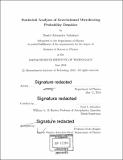Statistical analyses of gravitational microlensing probability densities
Author(s)
Yahalomi, Daniel Alexander
DownloadFull printable version (5.823Mb)
Other Contributors
Massachusetts Institute of Technology. Department of Physics.
Advisor
Paul L. Schechter.
Terms of use
Metadata
Show full item recordAbstract
Gravitational microlensing is a powerful modelling tool, that is essential in accurately understanding the lensing behavior of astronomically strong lensed objects. Using Joachim Wambsganss micro-magnification maps, we discuss the creation of a Monte-Carlo tool that can determine the likelihood for microlensing to account for flux ratio anomalies between macro-models and observations. We apply this tool to the study of iPTF16geu, a recently discovered type IA lensed supernova, and determine that it is unlikely for microlensing alone to account for flux ratio anomalies. We apply the tool, and an extension of the tool that allows us to predict the source's intrinsic magnitude, to Huchra's Lens. We study the light curves of Huchra's lens over time, and predict that image B is stuck in an uninteresting place in its micro-magnification map, causing its microlensing to consistently corrupt the source light curve over the past twenty years. Using Charles Keeton's lens model, a macro-modelling tool, we investigate the quadruply lensed system, DES J0408-5354. We present a new macro-model for the system, which predicts that image C, a perturbed saddle point, is outside the second perturbing galaxy relative to the primary lensing galaxy. This represents a new macro-model for the system, supported by recent unpublished Hubble observations. Finally, we present a method for investigating the quasar continuum emitting region size, and a way to test the point-like assumption at varied wavelengths. We discuss the framework and describe the process for how future work can provide essential constraints on the quasar continuum emitting region.
Description
Thesis: S.B., Massachusetts Institute of Technology, Department of Physics, 2018. Cataloged from PDF version of thesis. Includes bibliographical references (pages 67-69).
Date issued
2018Department
Massachusetts Institute of Technology. Department of PhysicsPublisher
Massachusetts Institute of Technology
Keywords
Physics.